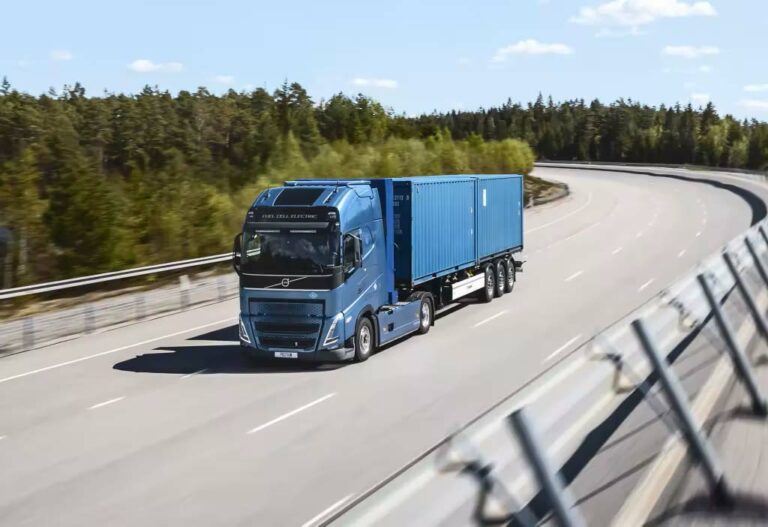The Department of Transport (DoT) announcement that the world’s first hydrogen-powered digger would be allowed on the UK’s roads has sent a wave of excitement through the construction industry. As with the haulage and logistics sectors, construction has been trying to progress down the road to net zero for some years, and hydrogen-powered trucks and plant vehicles are critical to this.
The DoT’s decision to allow a hydrogen-powered plant vehicle on our roads – a world first – offers potentially huge benefits to the construction, haulage, and logistics industries. Not only could they provide a shortcut to net zero, but they could also create hundreds of green jobs, cut operating costs, and potentially impact on truck, fleet, and plant insurance quotes.
As one of the UK’s leading independent logistics, haulage, and plant insurance brokers, the Coversure Castle Donington team is acutely aware of the significance of developments such as this. In this blog, we’ll look at the pros and cons of hydrogen power for trucks and special types fleets, and ask if hydrogen is the future of trucking.
We hope you will find this blog of interest. If you’d like some help getting the fleet, truck, or plant insurance that’s right for you, then please get in touch. You can call us on 01332 320540, email Coversure Castle Donington, or start your fleet, truck, or plant insurance quote here.
Hydrogen-Powered Vehicles: The Pros
Hydrogen-powered vehicles – especially hydrogen-fuelled trucks – have been vaunted as a potential green game changer, but what are the advantages of hydrogen-powered vehicles? The main ones are:
- Green Power – It’s arguable that the greatest challenge facing the UK construction and logistics industries is the need to reduce emissions. The creation of the ‘built environment – roads, homes, factories, offices, etc. – contributes 25% of the UK’s total CO2 emissions, according to the Department of the Environment. Hydrogen not only offers a zero-emission power source, but it’s renewable and can be produced from various sources, including gas, nuclear power, and wind on demand.
- More Powerful Than Batteries – while the car and commercial vehicle fleet world has been focused on electric vehicles (EV), concerns over power and range have dogged their use in plant and heavy goods vehicles. While the likes of John Deere have electric plant vehicles on the market, and Tesla and Daimler have produced electrically powered trucks, these are yet to be proven. 100 Tesla’s Semis will go into service this year, but even Tesla’s fast charging points will take some time to charge them, and there’s uncertainty around how far they will be able to go in real-world scenarios when fully loaded.
- Established technology – even the most ardent EV advocate will admit that electric vehicle technology – especially electric plant and electric trucks – is in its infancy. The hydrogen digger that JCB has created works by using a tried and tested internal combustion engine. The only real difference is that it burns hydrogen rather than diesel. So, when it comes to future development and maintenance, hydrogen vehicles have the advantage of building on tried and tested technology.
- Running costs – the cost of hydrogen as a fuel is approximately half that of diesel. Construction and haulage firms have had to deal with sharp fuel price rises over the past few years, and the prospect of cutting these must make them an attractive proposition.
- Long-lived fuel cells – unlike batteries which have (as it stands) relatively short lives, hydrogen fuel cells can last for a long time. They are also quick to refill and are expected to match diesel in terms of vehicle range.
Hydrogen-Powered Vehicles: The Cons
Rarely do revolutionary innovations come without a downside, and electric vehicles are no different as the following shows:
- Hydrogen-powered vehicles are expensive – as we’ve seen with electric fleets, the cost of electric cars and commercial vehicles are considerably higher than for their fossil-fuelled equivalents. Manufacturers need to pay off the huge investment costs in developing them, and while the cost-per-mile savings are there, they take years for owners to recoup. This issue is likely to be worse for plant and HGV owners who are looking to switch to hydrogen. The technology is complex and requires extremely high pressure to make it work in addition to safe storage systems for the hydrogen itself. Precious metals such as platinum and iridium are typically required as catalysts in fuel cells, which means that the initial cost of required fuel cells and electrolysers can be high.
- Lack of refuelling points – this is something that held back EV adoption for years. While there are now more charging points than filling stations, and the speed of charging has improved, this is an area where hydrogen is coming from a standing start. Unlike adding electric charging points to depots or logistics hubs, adding a supply of hydrogen to a haulage yard isn’t something that will happen any time soon. Hydrogen is also expensive to transport, which could add to vehicle owners’ costs.
- Lack of sustainability – while hydrogen vehicles are emission-free – all that comes out of the exhaust pipe is water – creating the fuel isn’t. At present, most hydrogen is produced using natural gas and produces enormous emissions in the process. While it can be produced by using nuclear and wind power, this technology isn’t commercially viable as yet.
- Safety and storage issues – as any GCSE chemistry student will tell you, hydrogen is extremely flammable. Ignition can occur at a volumetric ratio of hydrogen to air as low as 4% due to the oxygen in the air and the simplicity and chemical properties of the reaction. Put simply, it’s not that stable and would need careful handling, especially as its flame is almost invisible in daylight.
- Public acceptance and legal Issues – the airship disasters of old have embedded a deep concern about hydrogen, and while the technology has moved on and the volumes required for plant vehicles are so much lower, public acceptance could be a problem. Legally there are likely to be constraints too. If a hydrogen fuel cell was to rupture in a collision, the effects could be devastating. This is certainly going to be an aspect that insurers will consider when working out plant insurance quotes for these pieces of kit.
Hydrogen: The Plant & Truck Fuel Of The Future?
While hydrogen technology for plant vehicles and trucks is still in its infancy, there’s obviously good reason to be excited about it. Its abundance, ability to provide sufficient power, quick refuelling, and low environmental impact make it something that’s bound to play a big part in the construction, logistics, and haulage industries’ road to net zero.
It is, however, a fuel of the future. JCB is to be applauded for what they’ve achieved here, but the barriers to mass market adoption are currently high, and it will take time and money to overcome them. That said, with the cost and environmental benefits on offer, we’re not betting against it becoming as familiar as diesel is today one day…
Need A Truck Insurance Quote?
If you’d like some help getting the fleet, truck, or plant insurance that’s right for you, then please get in touch. You can call us on 01332 320540 or email Coversure Castle Donington.





